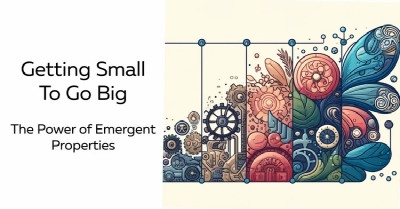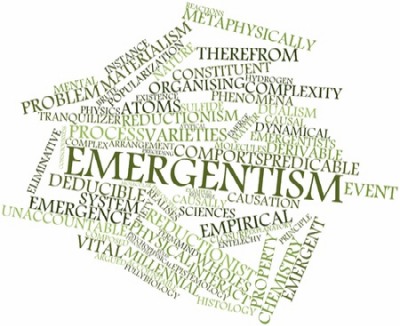|
I recently reread this post about AI and emergent properties, from May 2003, and was blown away by its prescience and relevance. (In posting about old posts I seem to be following the New Yorker's example and reusing content in lieu of new thinking, but in this case it's delightfully "meta", as new observations have "emerged" over time).
 Little did I know or could have known that 21 years later AI would be at the forefront of all tech, and that it would be a "brain dead" form of AI, without heuristics, happily using applied statistics to synthesize emergent properties. We can now hypothesize that not only does this lead to "intelligence", but it might be all that ever does; there are no underlying heuristics at all. In this, I find an analogy to Alpha Zero, which learned to play great chess (and famously, even greater Go) simply from the rules of the game, without any heuristics. Little did I know or could have known that 21 years later AI would be at the forefront of all tech, and that it would be a "brain dead" form of AI, without heuristics, happily using applied statistics to synthesize emergent properties. We can now hypothesize that not only does this lead to "intelligence", but it might be all that ever does; there are no underlying heuristics at all. In this, I find an analogy to Alpha Zero, which learned to play great chess (and famously, even greater Go) simply from the rules of the game, without any heuristics.
Heuristics are certainly useful as summarizing shortcuts, greatly reducing the computation necessary, but they emerge from patterns in the information, not vice versa.
 In the post linked above AI pioneer Marvin Minsky was quoted as saying "AI can't deal with concepts like water is wet'". That was true in the 1970s. And it was thought that to deal with this, "wet" would have to be defined, and an association between "water" and "wet" would have to be made. Now we can see that a concept like "wet" emerges from the presence of things like water, and so the association is causative, water "causes" wetness. Such properties are a function of observation, they are not inherent nor are they explicit, and they are to some extent influenced by the observer as well as the thing itself. In the post linked above AI pioneer Marvin Minsky was quoted as saying "AI can't deal with concepts like water is wet'". That was true in the 1970s. And it was thought that to deal with this, "wet" would have to be defined, and an association between "water" and "wet" would have to be made. Now we can see that a concept like "wet" emerges from the presence of things like water, and so the association is causative, water "causes" wetness. Such properties are a function of observation, they are not inherent nor are they explicit, and they are to some extent influenced by the observer as well as the thing itself.
 Consider a more abstract property like "beauty". Not only is it famously "in the eye of the beholder", but it is only such, it does not exist in and of itself. (This point is made in another old post made only a week later, God and Beauty; I did not make the connection at the time!) Labeling things as "beautiful" does not make them so, and a definition of beauty without examples doesn't get very far. We can describe the effect of its perceived presence on an observer, and the commonality between things exhibiting "beauty" is mostly in these effects, not the described objects. (What other commonality exists, for example, between a beautiful person and a beautiful algorithm ... or a beautiful philosophy?) Consider a more abstract property like "beauty". Not only is it famously "in the eye of the beholder", but it is only such, it does not exist in and of itself. (This point is made in another old post made only a week later, God and Beauty; I did not make the connection at the time!) Labeling things as "beautiful" does not make them so, and a definition of beauty without examples doesn't get very far. We can describe the effect of its perceived presence on an observer, and the commonality between things exhibiting "beauty" is mostly in these effects, not the described objects. (What other commonality exists, for example, between a beautiful person and a beautiful algorithm ... or a beautiful philosophy?)
|




